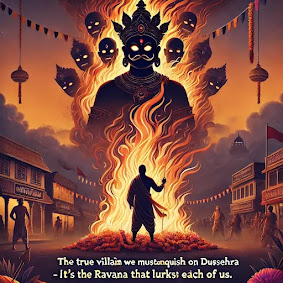Real Meaning Of Dussehra

Real Meaning of Dussehra
"The
true villain we must vanquish on Dussehra isn't a demon king – it's
the Ravana that lurks within each of us."
So, today
was Dussehra, and yes, I know I'm a bit late in writing this blog, but I hope
you’ll forgive me for the delay. Here I am, sharing my thoughts on this special
festival. For those unfamiliar with Dussehra, also known as Vijayadashami, it
is one of India’s most celebrated festivals. This vibrant occasion, observed in
the month of Ashwin (September-October), marks the triumph of good over evil.
The roots of
Dussehra are deep in Indian mythology, connected to two major stories. In North
India, the festival commemorates Lord Rama’s victory over the demon king
Ravana, symbolizing the victory of good over evil. People celebrate by staging
elaborate performances of the Ramayana, known as Ramlila, and by
burning effigies of Ravana, his brother Kumbhkaran, and his son Meghnath, to
signify the end of evil.
This event
takes place every year, with Ravana burned each time, as a symbol of evil’s
defeat. But here’s where my perspective might differ from many of my fellow
Hindus, and while I hope not to offend anyone, I feel this needs to be said: I
believe that simply burning Ravana year after year serves no real purpose.
Ravana, despite his intelligence and knowledge, was ultimately consumed by his
ego, which led him to commit sins like the abduction of Sita. In the end, he
was defeated by Lord Rama, sought forgiveness, and attained mukti
(liberation). Some versions of the Ramayana suggest that Ravana actually
knew his fate and embraced it, believing that by dying at the hands of Lord
Rama, he would find liberation. So, if Ravana has already attained liberation,
why do we continue to burn him every year? Before Ram was going to kill him he
sought forgiveness from Ram so he is not anymore against Ram.
I feel that
Dussehra isn't just about burning effigies of Ravana. It’s about the burning of
the Ravana within ourselves. However, just as we have done with many of our
festivals, we’ve lost sight of the deeper meaning of Dussehra. We enjoy reading
or watching these stories, but we rarely seek out the lessons within them. This
is one of the biggest problems we face today. Many people still believe that
Ravana actually had ten heads, but this isn’t meant to be taken literally; it’s
a powerful symbol. Ravana’s ten heads represent our human tendencies and flaws,
which we should aim to overcome.
According to
Vedic philosophy, we are not simply this body; the ahamkara (ego)
convinces us that we are the doers of everything, making us forget our true
nature of sat-chit-ananda (truth, consciousness, bliss). Aham is the ego
which under cover of avidya believes itself to be doer forgetting its real
nature and this Aham is Ravana and we have to kill it. Ravana symbolizes this
ego, the part of us that forgets who we truly are. Dussehra, then, is about
conquering our inner Ravana, destroying our ego, and embracing a life of wisdom
instead of ignorance.
Each of
Ravana’s ten heads is a symbol of something within us that we need to control.
These can be interpreted in different ways, as scriptures like the Shiv
Purana remind us that mythological stories can have multiple meanings. The
ten heads can represent the ten senses (five sense organs and five organs of
action), or as I believe, they symbolize negative qualities and emotions:
1.
Kama (Lust)
2.
Krodha (Anger)
3.
Moha
(Delusion)
4.
Lobha (Greed)
5.
Mada (Pride)
6.
Maatsarya
(Envy)
7.
Buddhi
(Intellect)
8.
Manas (Mind)
9.
Chitta (Will)
10.
Ahamkara (Ego)
These ten
heads represent the qualities we need to conquer to attain true
self-realization. By destroying these inner qualities, we, too, can achieve
liberation. Ravana has already achieved mukti and is no longer opposed
to Lord Rama. Instead of mindlessly burning effigies, we should focus on
fighting our inner ignorance and transforming ourselves. Only if we make an
effort to conquer these flaws can we truly celebrate Dussehra.
Celebrating
Dussehra without self-improvement is like a student who hasn’t studied and celebrating
after results day—it doesn’t make sense. We should celebrate Dussehra only if
we’ve worked throughout the year to eliminate our inner vices. Unfortunately,
this is how we’ve ruined not only this festival but many others as well. I know
some readers may disagree with me, but I believe this is the reality.
The sages
and spiritual teachers didn’t intend for us to keep burning Ravana’s effigy
year after year. They wanted us to conquer the ego within ourselves, to burn
the Ravana within us. That’s the true meaning of Dussehra.
.jpeg)

Comments
Post a Comment